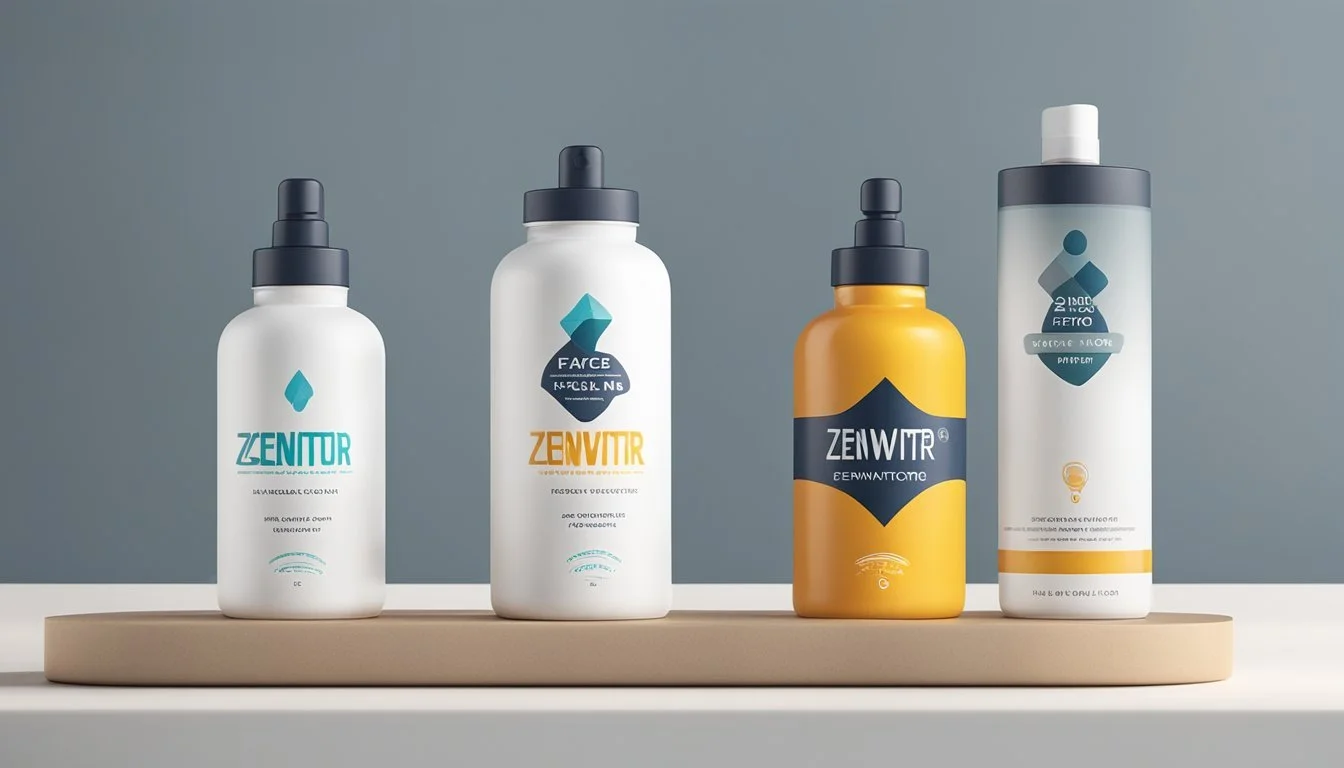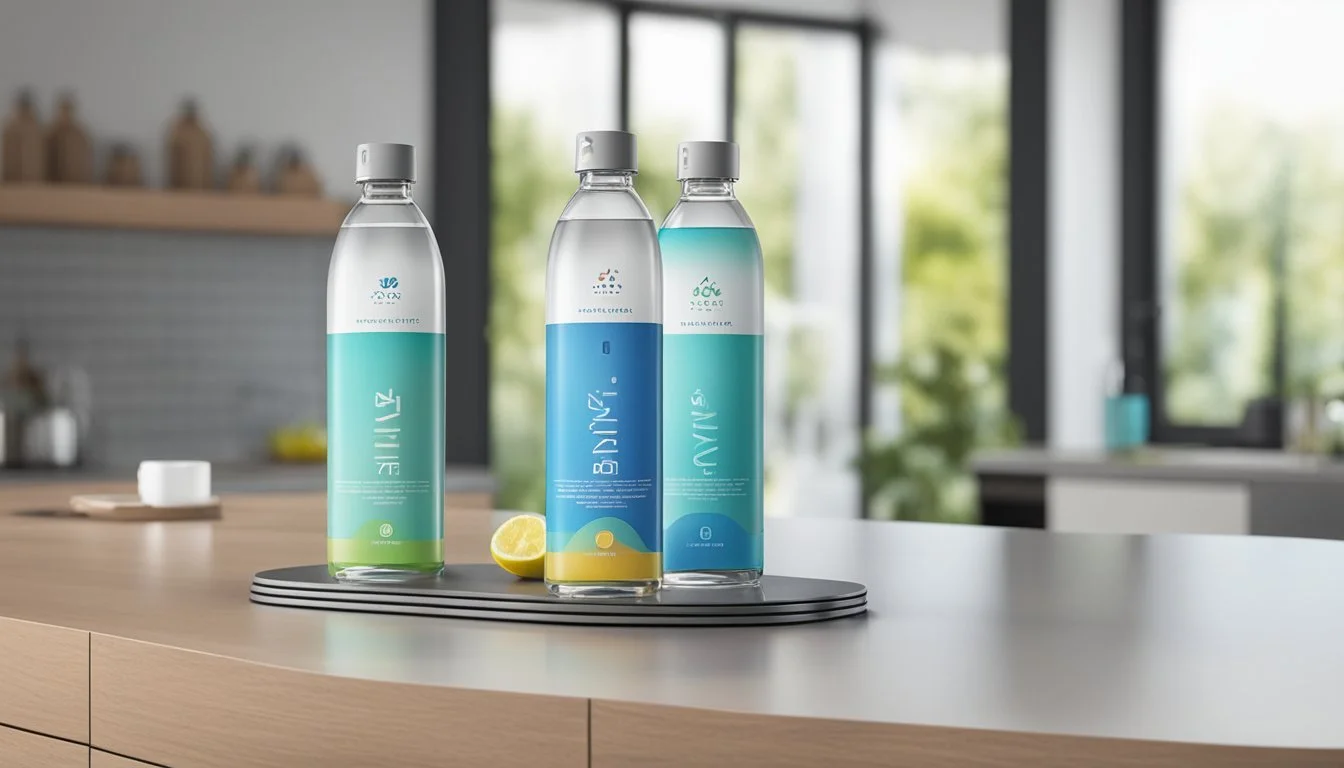Zenwtr vs. HFactor
Comparing Premium Bottled Water Brands
When it comes to choosing between ZenWTR and HFactor, the decision largely hinges on what you're seeking in bottled water. ZenWTR boasts a natural alkalinity with a pH of 9.5, appealing to those who prefer a higher pH. Its price range of $2 to $3 places it in the premium segment of the market, justified by its claims of sustainable packaging and eco-friendly initiatives.
HFactor, on the other hand, is known for its hydrogen-infused water, which may offer unique benefits like enhanced recovery and reduced inflammation. The brand focuses on providing hydration that potentially supports athletic performance and overall wellness. For consumers prioritizing cutting-edge hydration solutions, HFactor could offer that competitive edge, while ZenWTR represents a balanced option with its naturally alkaline properties.
Ultimately, the better choice between ZenWTR and HFactor depends on individual preferences and health goals. If natural alkalinity and eco-conscious practices catch your attention, ZenWTR fits the bill. For those intrigued by innovative hydration methods, HFactor’s hydrogen water might be the more appealing option.
Water Quality and Purity
ZenWTR and HFactor stand out due to their distinct approaches to ensuring water quality and purity. This section explores filtration methods, pH levels, alkalinity, and the mineral content along with their associated health benefits.
Filtration Methods
ZenWTR boasts a meticulous filtration process that includes reverse osmosis and several other advanced purification stages. This ensures the removal of impurities and contaminants, leaving the water highly pure.
HFactor employs a unique hydrogen-infused water technology, which claims to enhance the body's absorption of water. Though it employs strict filtration methods, including ultrafiltration and carbon filtration, it's the hydrogen infusion that sets it apart.
Both brands emphasize the safety and cleanliness of their water. However, ZenWTR’s use of reverse osmosis might appeal more to consumers familiar with robust purification techniques.
PH Levels and Alkalinity
ZenWTR is categorized as alkaline water with a pH level typically ranging between 8.5 to 9.5. This is achieved through natural ionization, which proponents believe offers various health benefits including better hydration and balancing the body's pH levels.
HFactor focuses less on alkalinity and more on its hydrogen content. Hydrogen water, such as HFactor, tends to have a neutral pH level but is praised for its potential to reduce inflammation and oxidative stress.
For those specifically seeking the benefits of alkaline pH, ZenWTR could be a better choice due to its higher pH level. On the other hand, those interested in potential therapeutic benefits might prefer HFactor.
Mineral Content and Health Benefits
ZenWTR contains essential minerals like calcium, magnesium, and potassium, which not only enhance the water’s taste but also provide necessary nutrients the body needs. These minerals contribute to electrolyte balance, aiding in muscle function and hydration.
HFactor, with its hydrogen infusion, does not emphasize mineral content. Instead, it focuses on the purported benefits of hydrogen molecules, which may include improved athletic performance and reduced recovery times.
While ZenWTR offers a notable array of essential minerals, HFactor's unique selling point remains its specialized hydrogen technology. Consumers looking for mineral-rich hydration should consider ZenWTR, whereas those interested in innovative health benefits may lean towards HFactor.
Environmental Impact and Sustainability
ZenWTR and HFactor are both conscious of their environmental impact, with efforts focused on sustainable packaging, reducing plastic waste, and obtaining relevant certifications.
Packaging Materials
ZenWTR uses recycled ocean-bound plastic for their bottles, making them pioneers in the use of recovered plastics. This approach helps mitigate environmental damage by repurposing waste that would otherwise end up in the ocean.
HFactor, in contrast, uses aluminum pouches that are fully recyclable and lightweight. Aluminum boasts a high recyclability rate, ensuring that the packaging has a lower environmental footprint compared to traditional plastic bottles.
Both brands aim to reduce reliance on virgin plastic but use different materials to achieve their sustainability goals. Their choices reflect an effort to balance functionality with eco-friendly packaging solutions.
Plastic Waste and Ocean Conservation
ZenWTR places a strong emphasis on plastic waste reduction and ocean conservation. By using ocean-bound plastic, they actively participate in efforts to clean up marine environments. This initiative helps decrease the amount of plastic pollution in oceans, making ZenWTR a leader in ocean-friendly practices.
In terms of plastic waste management, ZenWTR's bottles are 100% recyclable. This closed-loop system encourages users to recycle their bottles, further minimizing environmental impact.
HFactor’s use of aluminum pouches contributes to reducing plastic waste. Although aluminum still requires energy to recycle, it offers a more sustainable alternative with its repeated recyclability. Both companies address plastic pollution, though their methods differ in materials and environmental strategies.
Sustainable Brands and Certifications
ZenWTR is a Certified Plastic Negative brand, offsetting twice the amount of plastic it uses by funding the removal of plastic waste. This certification underscores ZenWTR's commitment to reducing plastic's environmental impact and supports large-scale ocean conservation projects.
HFactor also commits to sustainability but through different partnerships and certifications. Their dedication includes sourcing environmentally friendly materials and ensuring that their products contribute less to environmental concerns associated with plastic pollution.
Both brands are working towards more sustainable operations but highlight different aspects of environmental responsibility, from certifications to partnerships with environmental organizations. Their efforts illustrate a broader push within the bottled water industry to address pressing environmental challenges.
Taste and Drinkability
Evaluating the taste and drinkability of ZenWTR and HFactor is essential for determining which bottled water is superior. Key points include how each brand achieves its unique flavor profile and the natural mineral content that contributes to their respective tastes.
Importance of Taste in Hydration
Taste influences hydration effectiveness. People generally prefer drinking water that tastes clean and refreshing. Natural mineral content can significantly affect the water's taste. For example, water with higher mineral content often has a richer, more complex flavor, which some people find more appealing.
When the taste is pleasant, individuals tend to drink more, promoting better hydration. Therefore, the taste of bottled water is not just about preference; it also impacts our hydration habits.
Comparison of Zenwtr and HFactor Flavors
ZenWTR features a natural alkalinity with a pH level of 9.5, attributed to its mineral-rich content. This offers a smooth, clean taste that appeals to those who prefer a more substantial flavor in their drinking water. The higher pH also makes it a favorite for individuals seeking alkaline water.
HFactor, in contrast, emphasizes its hydrogen-infused water which is purported to have health benefits. The flavor is described as very clean due to the lack of minerals, making it comparable to pure, distilled water. This neutral taste might be preferred by those who like minimalistic flavors.
In summary, ZenWTR and HFactor offer distinctive taste profiles that cater to different preferences, shaped by their unique mineral content and purification processes.
Economic Factors
Examining the economic aspects of ZenWTR and HFactor involves comparing their prices and analyzing their presence and visibility in the market.
Price Comparison
Price is a critical factor for many consumers. ZenWTR, known for its naturally alkaline water, often targets the premium segment. The cost reflects its high-pH level and eco-friendly packaging. A 16.9-ounce bottle of ZenWTR typically ranges from $1.50 to $2.00.
HFactor, on the other hand, markets its hydrogen-infused water as a unique health benefit. Prices for a similar 16.9-ounce bottle of HFactor also fall in the $1.50 to $2.00 range. While both brands are positioned as premium products, ZenWTR's emphasis on sustainability might justify any slight price differences for environmentally-conscious consumers.
Market Presence and Brand Visibility
Both ZenWTR and HFactor have carved out their niches in the competitive bottled water market. ZenWTR's eco-friendly initiative—using 100% ocean-bound plastic bottles—has garnered significant attention. This unique selling point differentiates it and enhances market visibility, particularly among environmentally aware consumers.
HFactor focuses on the health-conscious demographic, promoting the benefits of hydrogen-infused water. Its distinctive product offering has helped establish a solid presence, especially in health and wellness channels.
ZenWTR's strategy includes robust marketing campaigns and partnerships, which have boosted its visibility in retail and online platforms. HFactor's approach, leveraging endorsements from athletes and fitness enthusiasts, has also increased brand awareness, particularly within the fitness community.
Innovative Technologies and Processes
ZenWTR and HFactor employ unique technologies and methods to ensure high-quality bottled water. These innovations impact the mineral content, taste, and environmental sustainability of each brand's products.
Patented Filtration Systems
ZenWTR uses an advanced Hydro-7 filtration process. This multi-stage system includes carbon filtration and reverse osmosis, which purifies the water by removing impurities and contaminants. The water is further alkalized to reach a pH of 9.5, enhancing its smooth taste and potential health benefits.
HFactor distinguishes itself with a proprietary method that infuses the water with molecular hydrogen. This process aims to increase the energy levels and antioxidant properties of the water. The patented technology behind HFactor’s hydrogen infusion has been lauded for its innovative approach to enhancing the benefits of bottled water.
Unique Selling Propositions
ZenWTR prioritizes environmental sustainability. The brand uses bottles made from 100% recycled ocean-bound plastic, positioning itself as a leader in eco-friendly practices. Its commitment to carbon neutrality and reduction of plastic waste contributes to a positive environmental impact.
HFactor’s unique selling point is the addition of hydrogen. Marketed as water that can potentially improve energy levels and reduce muscle fatigue, HFactor attracts those interested in health and wellness benefits. Its innovative packaging, which preserves hydrogen content until consumption, adds an extra layer of differentiation.
In comparing these two brands, consumers must consider both the environmental initiatives and the health-focused innovations that set ZenWTR and HFactor apart in the crowded bottled water market.
Health and Wellness Contributions
ZenWTR and HFactor each offer distinct health benefits and wellness features that cater to specific needs. These elements impact hydration, physical performance, and potential benefits for digestion and skin health.
Hydration and Physical Performance
Proper hydration is pivotal for optimal physical performance. ZenWTR, sourced from natural spring water, maintains a balanced pH level which can aid in maintaining body temperature and energy levels during exercise. Its mineral content supports recovery after strenuous physical activity.
HFactor, infused with molecular hydrogen, claims enhanced benefits. Hydrogen acts as an antioxidant, potentially reducing muscle fatigue and improving endurance. Users report increased energy and quicker recovery times following high-intensity workouts.
Both brands emphasize proper hydration which is crucial for day-to-day activities. They cater to different aspects of physical performance, with ZenWTR focusing more on pH balance and HFactor on antioxidant properties.
Potential Effects on Digestion and Skin Health
ZenWTR’s naturally alkaline pH may help neutralize excess stomach acid, offering relief from acid reflux and aiding in smoother digestion. The clean, mineral-rich profile can improve overall digestive health and contribute to skin health by promoting hydration at a cellular level.
HFactor highlights the potential of hydrogen-infused water in reducing oxidative stress. This can improve the skin by minimizing free radicals that lead to aging and other skin issues. Additionally, users’ anecdotal reports suggest benefits for digestion, highlighting a reduction in bloating and discomfort.
Each brand offers unique claims and benefits focusing on different health concerns. Their impact on digestion and skin health varies, catering to diverse consumer needs.
More About Zenwtr
Mountain Valley Spring Water vs Zenwtr: Which Bottled Water is Better?
Richard's Rainwater vs Zenwtr: Which Bottled Water is Better?
Whole Foods Italian Still Mineral water vs Zenwtr: Which Bottled Water is Better?
Zenwtr vs Kirkland Signature: Which Bottled Water is Better?
More About HFactor
Icelandic Glacial vs HFactor: Which Bottled Water is Better?
Kirkland Signature vs HFactor: Which Bottled Water is Better?
Mountain Valley Spring Water vs HFactor: Which Bottled Water is Better?
Richard's Rainwater vs HFactor: Which Bottled Water is Better?
Whole Foods Italian Still Mineral water vs HFactor: Which Bottled Water is Better?



